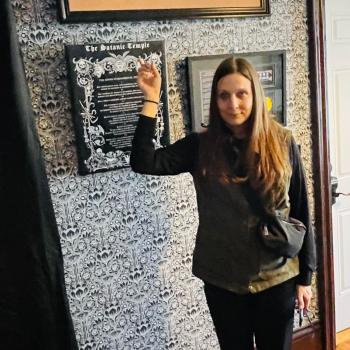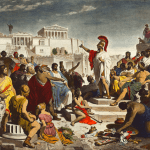With the rapid rate of growth in the broader Pagan community change is inevitable. This requires a new model of Pagan leadership. That being said, what qualities will these transformative leaders possess? It seems it becomes necessary to define the qualities of a transformative Pagan leader and establish the dynamic of organizational change a leader must manage, in terms of Pagan culture, structure and the community of individuals that make up an organization.
Today’s Pagan organizations need leaders who are transformative in assisting organizations to develop new goals, establish support and actionable by-in from community members. These leaders will need to possess the ability to take established organizations and manifest something new and positive. Transformative leaders, by their example, rather than authority, bring about change in organizations basic cultural and political systems.
All to often-Pagan organizations seek out leaders who are focused on maintaining the status quo. These leaders engage in perpetuation of the current leadership dynamic and power structure. Nor are they focused on the need for their organization to grow and evolve in order to be meaningful to successive generations of Pagans.
Generally, transformative leaders are selected when there is a triggering event in an organization. Examples of this could be a decline in membership, funds or general support for the organization.
Changes modeled by these leaders tend to encounter three types of reactions. First, change tends to create energy to overcome inertia. Second, strong negative feelings and resistance from members are inevitable. Finally, the feeling that acknowledging the need for changes is an indictment of past leadership.
Transformative leaders tend to revitalize organizations by creating a new vision, institutionalizing that vision by modeling direct action and manifesting a new organizational culture that is not change phobic.
This is accomplished by creating a process where:
Past organizational accomplishments and leadership are acknowledged and put into historical context.
Unique approaches are modeled as a possible antidote for the triggering event that brought the transformative leader to the forefront.
Collaboratively establishing a new set of values that brings a refreshed sense of worth to the organization.
These actions lead to a stage of “growth” where community members look at new ways to interact, see the past as an opportunity to learn rather than a place to dwell and become excited about new possibilities and community actions.
An additional obstacle to the transformative approach is a concept in organizational leadership known as “Founders Syndrome” Generally our founders were transformative in approach, But in “Founders Syndrome” these very leaders lack the foresight to establish a plan for organizational success beyond their time as a transformative leader.
Organizations are left to wallow in past accomplishments with no clear plan for the future. Founders are venerated and their approaches manifested into a future where their examples may be of little use due to changing organizational dynamics, technology or community needs.
Transformative leaders generally consider their tenures as temporary, manifesting a positive change in direction and developing a succession plan that recognizes that the qualities of a transformative leader may not be suited to the long-term administration of an organization.
So how do we find these transformative leaders? Lets start with the qualities they possess.
They believe strongly that change begins with personal example.
They seek to include all community members in a collaborative process.
They are focused on the future.
They have organizational, logistical, and public speaking skills.
They are publicly Pagan.
They are risk takers.
They believe in the ability of the community to come together.
They are not necessarily religious leaders.
They are often (but not always) in a middle generation, not yet Elders but well established in their communities, able to communicate between generations.
Pagan Organizations who are seeing a lack of growth or motivation in their membership can benefit from transformative leadership. Is it hard to acknowledge the need for change? Yes, but it would be even harder to witness the slow decline of great Pagan organizations that have been the life’s work of so many in our community.















